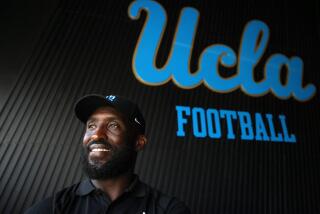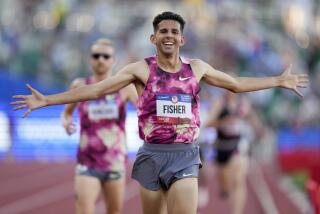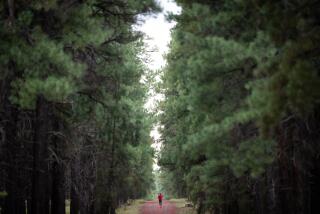RUNNING / BARBIE LUDOVISE : After a Stormy Track Career, Steiner Finds Niche as Biathlete
- Share via
The bad memories, Brent Steiner says, rarely haunt him anymore; he can run past the track at Arizona State now without giving a thought to what could have or should have been.
Eleven years ago, it wasn’t so easy.
Steiner, a professional biathlete who resides in Tempe, was considered one of the best young American runners in history of the sport, when he arrived at ASU as a freshman in 1980.
But after being targeted by the NCAA for alleged recruiting violations, Steiner’s college career took a turn for the worse and never recovered.
As a high school athlete in Kansas, Steiner was a four-time state champion in cross-country and track for Shawnee South High in Overland Park. As a junior, he ran the two mile in 8 minutes 46.99 seconds--ranking him as the 11th fastest two-miler in prep history. And as a senior, Steiner capped an undefeated 1979 fall season by winning the first Kinney National Cross-Country Championship at Balboa Park.
Some compared Steiner to Jim Ryun--he broke Ryun’s 15-year-old course record at the State cross-country championships as a junior--but other than that the fact that they both grew up in Kansas, there weren’t many similarities.
Ryun, from the flatlands of Wichita, had tremendous speed. Steiner, from the rolling hills of northeastern Kansas, relied on strength and endurance--much like American miler Steve Scott.
College recruiters battled for Steiner’s attention, but midway through his senior track season, he knew where he wanted to go. Len Miller, who coached Scott at UC Irvine, had recently taken over the distance program at ASU, and Scott was joining him as a graduate assistant.
Before making a commitment, Steiner visited the ASU campus and Miller came to Kansas to see him. A third contact was allowed by NCAA rules, so Miller sent Scott, then an unpaid assistant, to visit Steiner in Overland Park. While there, Steiner said, Scott went for a run with Steiner’s high school team, went out for pizza, and gave Steiner a ride home.
A local reporter spoke to Steiner about Scott’s visit. The next day, Steiner opened the paper and saw a story on possible NCAA recruiting violations--he and Scott being the focus.
A week later, NCAA officials asked Steiner to meet with them. He was told Scott’s three meetings with him--running, eating pizza, driving him home--constituted three separate contacts. Add that to the two meetings between him and Miller, Steiner was told, and a total of five contacts--two more than the limit--had occurred.
“But they said it was just a minor offense, that they’d write Miller and tell him to monitor his recruiting better,” Steiner said. “I figured it was settled.”
Not quite. After running a cross-country season at ASU, Steiner returned to Tempe after winter break to find a notice from the NCAA in his mailbox. It stated Steiner was banned from competition as long as he remained at ASU.
Steiner hired an attorney and went through a lengthy appeals process. His appeal was denied three times. He finally flew to the NCAA headquarters to plea for his case in person. He was politely told nothing could be done.
The case drew national attention. Runner’s World and Sports Illustrated wrote stories about Steiner’s predicament. “60 Minutes” called, but by then, Steiner saw no reason to fight--his appeals were exhausted and so was he.
He transferred to Kansas--the NCAA granted him four years of eligibility, minus one cross-country season--but Coach Bob Timmons’ program was one of 100-mile weeks and high-intensity track work three times weekly. Steiner had always thrived on low mileage and easy days, but Timmons refused to bend.
After three years of continual illness and injury, Steiner asked to be released from his full scholarship. He remained on the team--Timmons made the squad vote on whether Steiner should be allowed to do so--but trained on his own terms.
He worked hard, but rested when he felt the need to--and had a sterling season. Steiner was the only Jayhawk to qualify for the NCAA Cross-Country Championships that year, and finished seventh at the final. He became an All-American--the first for Kansas in 19 years.
Although Steiner and Timmons sat together as they flew to the NCAA meet without saying a word to each other, Timmons broke down in tears after the race.
“We were eating breakfast after the meet,” Steiner said. “And I looked over and Coach Timmons had tears coming down his face. I said, ‘Coach, is something wrong?’ And he just said, ‘Brent, you’ve finally reached the point where you should have been long ago.’ ”
After college, Steiner became a salesman for a telephone company, putting his running on hold. He was soon offered a promotion to manager, but with his parents’ encouragement, decided to forsake the corporate ladder for another serious stab at running.
Four years ago, he moved to Tempe.
“I felt like I was robbed the first time, that’s probably why I came back out here,” Steiner said.
Steiner says he’s never blamed Miller or Scott for being declared ineligible at ASU.
“(Scott) came from a Division II program. He didn’t know the rules,” Steiner said. “And it was Len Miller’s first year recruiting in Division I. . . . “
Actually, Steiner empathizes with a certain basketball coach at UNLV.
“Jerry Tarkanian’s my idol,” he said.
Steiner, who will race in the Coors Light Biathlon Aug. 4 at El Toro, got into the sport as most runners do. He was injured and started riding a bike with serious cyclists to keep in shape. Combining the two sports came naturally to him.
Last year, Steiner finished first in the overall standings of the Coors Light series grand prix, earning $16,500 in race money. A few sponsors, and a part-time sales job at a triathlon store in Tempe, help him make ends meet. But he’s hardly in it for the money.
“Winning the grand prix was a big deal for me,” said Steiner, who’s currently in fifth place after six races in the 15-race series. “Probably the most important thing, though, was I finally felt I was achieving something. Like I finally was the national-class athlete I thought I could be.”
Which, for Steiner, is the way to be in Tempe.
Notes
Former University High School standout Greg Whiteley, second in the New York Games mile in a career-best 3:56.01 last weekend, is leaving today for Europe to race in two world-class meets. Whiteley, 24, will run the 1,500 at Aarhus, Denmark and the 5,000 at Malmo, Sweden. He’s hoping to gain a 5,000-meter qualifying time for the World Championships in Tokyo, Aug. 24-31. Whiteley, seventh in the 5,000 at TAC nationals last month, needs to run 13:27.30 or better--about 10 seconds faster than his career best--to be considered for the third spot on the World Championship team. . . . Chris Rael of Fullerton, sixth in the Olympic Festival 50-kilometer racewalk last week, was one of 15 elite racewalkers invited to a week-long training session July 31 through Aug. 5 at the U.S. Olympic Training Center at Colorado Springs, Colo.
Readers with information on Orange County runners or running events may write Barbie Ludovise at The Times Orange County Edition, 1375 Sunflower Ave., Costa Mesa, 92626, or call 966-5847.
More to Read
Go beyond the scoreboard
Get the latest on L.A.'s teams in the daily Sports Report newsletter.
You may occasionally receive promotional content from the Los Angeles Times.









